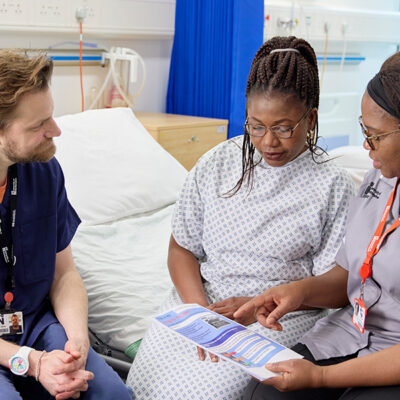

Diagnostic Reasoning for Practice
Key Facts
-
Module Code
NURM081
-
Duration
1 semester part time
-
Part Time 25/26: £945 (per 20 credits)
-
Waterside
Updated 03/11/2025
Updated 03/11/2025
Overview
Through the application of a problem-based approach, this module supports the student to develop their clinical thinking from the formulation of a differential diagnosis, to critically analyse and apply investigative findings to formulate a more definitive diagnosis. Students will be able to critique and apply expert knowledge to justify and be able to request relevant investigations, evaluating and adjusting plans of care based upon diagnostic reasoning.
Highlights
- Interactive and clinically focussed module content.
- Facilitated by practicing clinicians based within relevant specialities.
- Take as part of a full MSc or as a stand-alone module.
Entry Requirements
Applicants must hold an appropriate healthcare or bachelor’s degree with honours, or have evidence of recent level 6 study. They must be employed within a health and social care related environment and be a UK registered healthcare professional (minimum of 3 years).
Nurses, midwives, allied health professionals and pharmacists with current professional body registrations are encouraged to apply.
Students would benefit from completing a clinical examination module, prior to attending, to support the completion of the items of assessment.
For further information regarding this module please contact Jonathan Mounsey (module lead) via advancedpractice@northampton.ac.uk
What You'll Learn
This module you will support you to develop your clinical knowledge specifically focussed upon the requesting and interpretation of common clinical investigations. Through an active-blended learning approach utilising lectures, clinical laboratory time, online learning and scenario based interactive group work, you will develop the expert knowledge required for the interpretation of common Radiological imaging, common Biochemical and Haematological blood test, Advanced Electrocardiography, Microbiology and immunology, to enable you to apply investigative findings to help formulate a definitive diagnosis.
This module runs over one semester with 5 taught days, with one online activity learning day and one assessment day.
There are two components of assessment both weighted at 50%. The first is a case study of 2,000 words in which the student will focus upon a clinical scenario from their practice and critically analyse a chosen investigation, and how this has influenced their plan of care. The second is a case study presentation.
Using a theory-based approach, students will critically appraise current knowledge and evidence related to diagnostic tools used within practice. This will enable the student to provide a theoretical base from which to make efficient and effective decisions in relation to service user’s healthcare needs, and their management. This module follows on from Advanced Assessment and Clinical Reasoning (NURM080).
Diagnostic Reasoning for Practice can be taken as a stand-alone module or part of MSc Advanced Clinical Practice, Postgraduate Diploma in Clinical Advanced Practice, Postgraduate Certificate in Advanced Clinical Practice/MSc Advanced Clinical Practice (Top Up) and MSc Advanced Clinical Practice Degree Apprenticeship.
Fees and Funding
2025/26 Tuition Fees
Fees quoted relate to study in the Academic Year 25/26 only and may be subject to inflationary increases in future years.
- Module costs: £945 per 20 credit module
Please contact Karen Edwards for further information about fees for this module.
For more information about possible funding options, please visit our Fees and Funding pages.
Fees quoted relate to study in the Academic Year 24/25 only and may be subject to inflationary increases in future years.
- Module costs: £920 per 20 credit module
